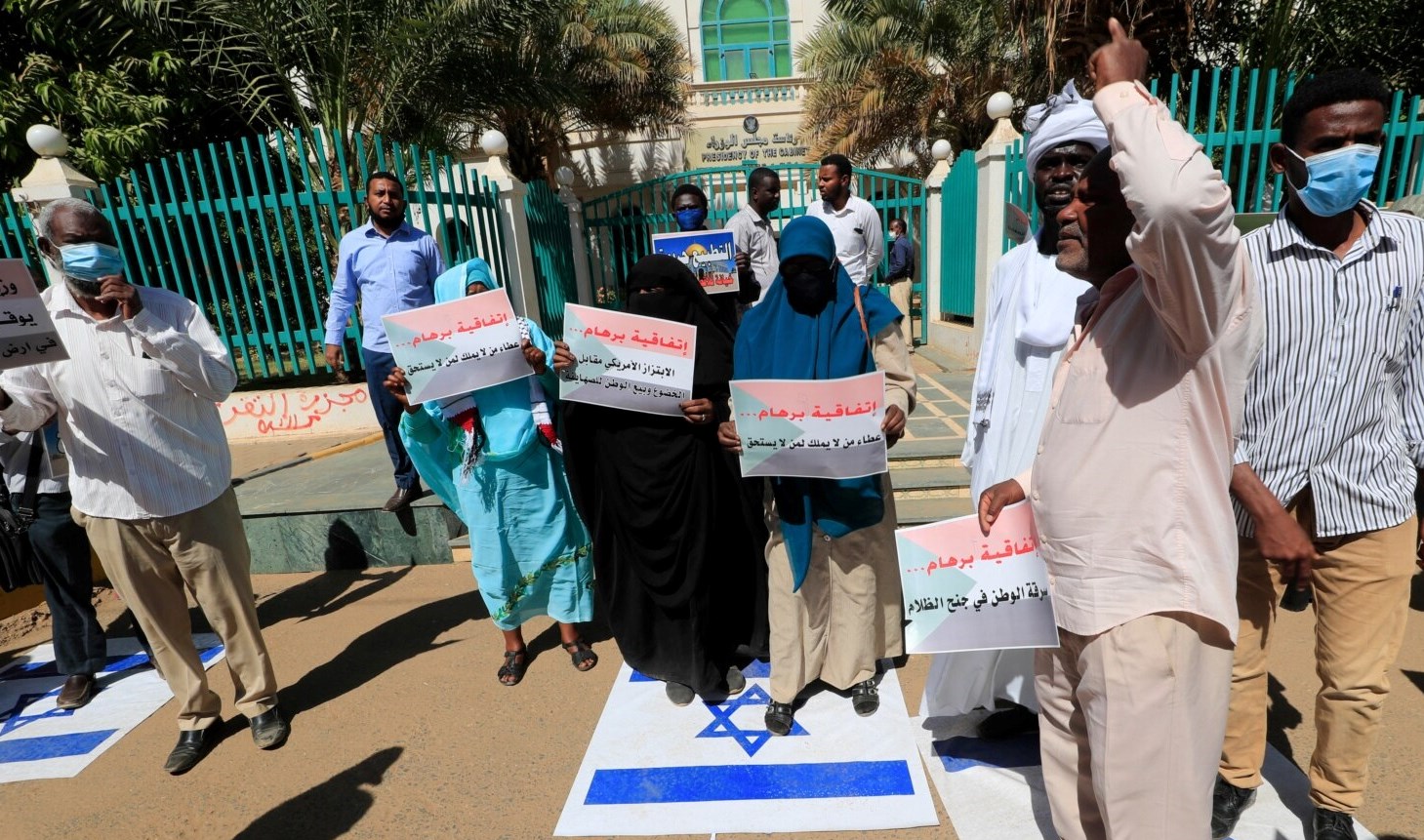Sudanese say no to fishy Israeli 'mediation'
A new report by truthout highlights the historical enmity that the Sudanese people have for the Israeli occupation.
-

Sudanese demonstrators chant slogans as they step on Israeli flags during a rally against their country's signing of a deal normalizing relations in Khartoum, Jan. 17, 2021 (AFP)
In a clear act of exploiting the ongoing clashes in Sudan, the Israeli occupation rushed to mediate a ceasefire between the Sudanese army and the Rapid Support forces to ensure normalizing ties with the African country.
"Israel" is seemingly well-positioned to serve as a middleman between the two opportunistic generals because of their solid relationships with both strongmen. Unsurprisingly, any representative of the Sudanese people was not invited.
Axios reported that "Israel" has been in contact with generals of both the #Sudanese Army Forces (SAF) and the Rapid Support Forces (RSF), urging them to stop their fighting as the ongoing clashes put the normalization deal between #Sudan and the occupation at risk. pic.twitter.com/BFoLIcdo83
— Al Mayadeen English (@MayadeenEnglish) April 20, 2023
A new report by truthout highlighted the historical enmity that the Sudanese people have for the Israeli occupation, which would render the political normalization agreement useless on the ground.
Sudanese parties have constantly expressed their rejection of the Sudanese government's move forward towards normalizing relations with "Israel".
A flashback
It all started in 2016 when the Israeli occupation urged the US to allow it to infiltrate into Sudan after the North African country severed diplomatic ties with the Islamic Republic of Iran. Following Saudi Arabia's lead, Sudan cut diplomatic ties with Iran after the storming of the Saudi Arabian Embassy in Tehran and the consulate building in the city of Mashhad.
In August 2017, then-Sudanese Minister for Investment, Mubarak Fadel Al-Mahdi, spoke for the first time about normalization with the Israeli occupation during an interview for the Sudania24 TV station.
And when General Abdel Fattah Al-Burhan came to power, he met in February 2020 with Israeli occupation Prime Minister Benjamin Netanyahu in Uganda.
Consequently, Khartoum was removed from the US blacklist in December 2020 after 27 years of imposed sanctions.
In January 2021, Sudan formally agreed to normalize relations with "Israel" in a quid pro quo for the United States to remove it from its list of so-called "state sponsors of terrorism," but ties were never formalized. In April of that year, the North African nation approved a bill abolishing a 1958 boycott of the Israeli occupation.
Finally, Sudan and "Israel," said in February they agreed to move toward normalizing relations during the first official visit of Israeli occupation Foreign Minister Eli Cohen to Khartoum.
It was obvious, as per the report, that "Israel" was dealing with al-Burhan as if he was the head of the Sudanese state, urging him to come to an agreement.
'Israel' and Sudan's generals
Additionally, various elements of the Israeli security apparatus have cooperated with various wannabe dictators in Sudan. The Israeli Foreign Ministry, which is more sympathetic to Al-Burhan, and the Mossad, which has formed close ties with Hemedti, are at odds over the ongoing conflict between al-Burhan and Hemedti. Simultaneously, "Israel" prefers to play the position of a middleman since it is hesitant to endorse any of the two opposing Sudanese parties due to their complex affiliations, the report assessed.
"Because each side has significant interests not just in wealth as well as power, the fighting began. The Sudanese civilian population has been caught in the middle. Meanwhile, in terms of Israel’s and the U.S.’ ongoing push for Sudan to fully sign on to the Abraham Accords, the Sudanese people are simply out of the loop," the report added.
In actuality, the Arab Opinion Index, which was published in January 2023, revealed that although Sudan had the second-highest proportion of Arabs who supported normalizing relations with "Israel', just 18% of the country's people did so, with 72% opposed.
This is all astonishing when taking into consideration that Sudan's unique circumstance—its severe economic distress, which makes it desperate for assistance from the West and the international financial system—might otherwise persuade more Sudanese to support normalizing ties with "Israel" that might bring American and European favor, support, and—most importantly—investment. However, the Sudanese popular movement, which has persisted in fighting for democracy, also urges the population to express solidarity with the Palestinians, the report noted.
"Israel knows very well that any sort of democracy in Sudan would put an impenetrable barrier in front of the Abraham Accords. A democratic Sudan would certainly insist on granting the Palestinians their rights before any sort of normalization. And, even before the latest fighting in Sudan, the military government was not stable enough to simply forge ahead with normalization," the report stated.
The report concluded that backing the Sudanese fight for democracy is crucial, as well as preventing the US administration from sabotaging the fighting in Sudan for the sake of "Israel's" political gains.
"Sudanese democracy demands it, as does justice for Palestinians, who will suffer yet another major setback if Sudanese-Israeli normalization is completed," as per the report.
Read next: 'Israel' eager to mediate ceasefire in Sudan: What are the reasons?

 5 Min Read
5 Min Read








